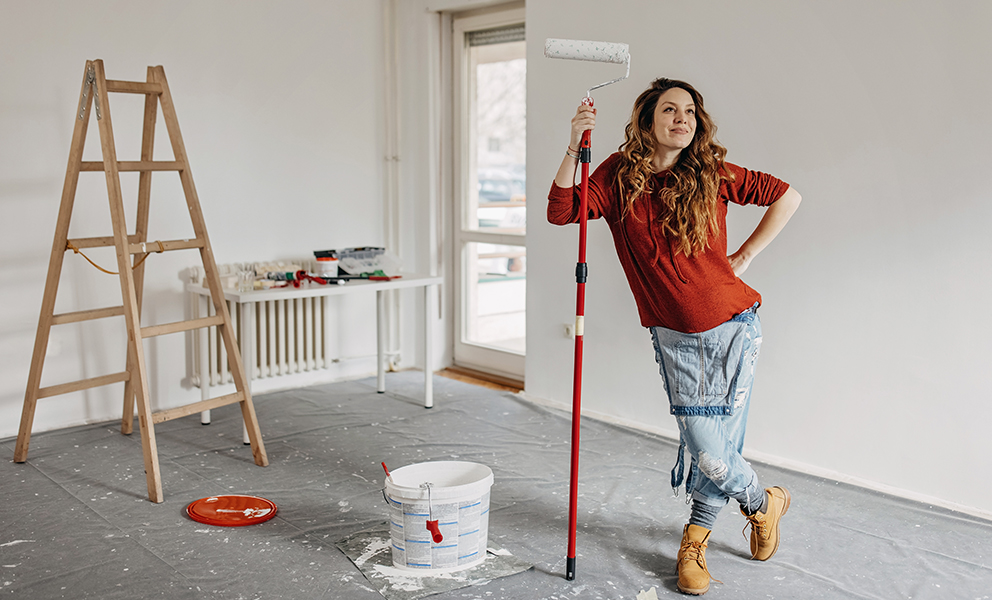
One of the biggest perks to being a homeowner is doing literally whatever you want with it. Whether it’s a structural necessity or an aesthetic preference, you can renovate and update your home on your own terms. The biggest question is whether you can (or should) do it yourself (DIY). If you’re stuck between taking on a project and shelling out the money to get it professionally done, here’s what you should consider.
Ask Yourself These Questions
Do you have the physical and mental fortitude to move forward with a renovation by yourself? This is what you should first ask yourself.
Do I Have DIY Experience?
Depending on the project, you may already have some experience. If you’ve done it before or even if you’ve taken on a similar project, you may even be able to do it again with confidence. If you don’t have experience with the project, consider that it may take some trial and error to do it correctly, which can take more time than you think.
Do I Even Enjoy DIY?
Begrudgingly starting a project might lead to more frustration and error. If you know you don’t like to DIY, it could be beneficial for you to go straight to the professionals in the first place.
What’s More Valuable: My Time or My Money?
This depends on you individually. For some, money is no issue. They’d rather save the time it takes to learn a skill and complete the project. For others, they’d rather use the money for something else they need: a car, bills or even a different renovation project. Decide what’s worth it for you.
Do I Already Have the Materials and Tools Needed?
If you don’t already have the supplies needed to complete the project, remember that this will cut into your home renovation budget and schedule as well. This small inconvenience can make a huge difference.
How Complicated or Dangerous is it?
Some projects are better left to the professionals. If you’re dealing with heights, electricity, heavy materials or anything that can severely injure you, hiring someone is probably your only option. Consider the safety and wellbeing of others around you as well. If you have pets or small children around, it may not be safe for them if you leave any hazardous tools or materials lying around.
The Benefits of Doing it Yourself
Save Money
In general, doing a project yourself is more cost-effective because you won’t be paying for the labor of others. Additionally, if you already have the tools and/or materials to complete your project, you shouldn’t have to pay for anything else.
Have a Sense of Accomplishment
Seeing your completed project is rewarding no matter what it is. Every time you pass it by in your home or whenever a guest points it out, you can be boastful knowing you did it without professional help.
Tackle Future Projects with Confidence
Experience with DIY home improvement projects can help you gain confidence when there’s another project to tackle in the future. Even if you have minimal experience with the project, just the knowledge of having done something similar before can be beneficial.
Complete on Your Own Timeline
One of the biggest benefits to doing home improvement projects yourself is that you can do it as quickly as you can and during the free time you have. There won’t be any random people in your home during work hours who make disruptive noises as you’re trying to work remotely or put your child down for a nap.
Have Complete Control
Some professionals may argue with you about your stylistic choices, and you’ll have to fight to have it look just the way you like it. You won’t have to worry about that when you do it yourself. Of course, if you’re not confident about your interior design skills, it can be nice to hear what a professional has to say.
The Benefits of Hiring a Professional
Receive High-Quality Results
Working with a reputable contractor will often yield higher quality results than doing it yourself as a novice. Unless you’re working with someone disreputable, you can likely expect exceptional work.
Be Insured
Contractors and companies are more likely to be insured, have liability permits in place and can get permits approved quickly. You may not even be able to start a project without proper permits in place.
Increase the Value of Your Home
Depending on the project, professional and properly done renovations can help increase the value of your home. When and if it comes time to sell, you may even be able to get more back than what you invested in it.
Have a Lower Margin of Error
Some mistakes could render your home unlivable. You may not want to take that chance if you take on a project yourself. A professional will be less likely to make any drastic mistakes that could make you temporarily (or even permanently) relocate.
Easy DIY Projects for Beginners
If you want to dip your toes into the world of DIY instead of diving head-first, consider these simple (and relatively cheap) projects.
Painting or Wallpaper
You can easily brighten up a room with a fresh coat of paint. Or if you don’t have time for a full room, a single accent wall can make a huge difference. If you’d rather avoid the paint mess, there’s good news: Wallpaper is back in. And it’s a great way to add character and interest to an otherwise dull room.
Update Your Hardware
Simply replacing the old and outdated handles on your kitchen cabinets with something more modern or unique could make a significant difference to the room. Consider changing out the hardware on any furniture as well, like your bedroom dressers or bathroom linen closet.
Add a Backsplash
A slightly more challenging DIY, adding a backsplash to your bathroom or kitchen sink can be a great focal point to the room while providing protection from wear and tear to your walls. It’s also easier to clean and the personalization options are limitless.
DIY or Pro? It All Depends on You
As you may have already deduced, deciding to take on a project yourself or not is highly dependent on your own capacity and financial situation. Researching the project, understanding your budget and timeline, and ensuring your and your family’s safety are all important steps to take before picking up the hammer.
This article is intended for general informational and educational purposes only and should not be construed as financial or tax advice. For more information on financial planning or investment advice, consult a registered investment advisor or financial planner.
This information is intended for educational purposes only. Products and interest rates subject to change without notice. Loan products are subject to credit approval and include terms and conditions, fees and other costs. Terms and conditions may apply. Property insurance is required on all loans secured by property. VA loan products are subject to VA eligibility requirements. Adjustable Rate Mortgage (ARM) interest rates and monthly payment are subject to adjustment. Upon submission of a full application, a mortgage banker will review and provide you with the terms, conditions, disclosures, and additional details on the interest rates that apply to your individual situation.


